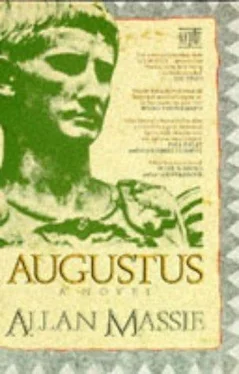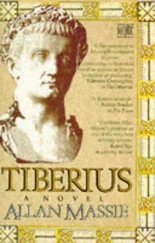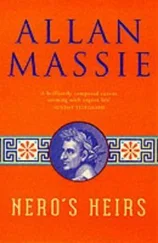Allan Massie - Augustus
Здесь есть возможность читать онлайн «Allan Massie - Augustus» весь текст электронной книги совершенно бесплатно (целиком полную версию без сокращений). В некоторых случаях можно слушать аудио, скачать через торрент в формате fb2 и присутствует краткое содержание. Жанр: Исторические приключения, на английском языке. Описание произведения, (предисловие) а так же отзывы посетителей доступны на портале библиотеки ЛибКат.
- Название:Augustus
- Автор:
- Жанр:
- Год:неизвестен
- ISBN:нет данных
- Рейтинг книги:4 / 5. Голосов: 1
-
Избранное:Добавить в избранное
- Отзывы:
-
Ваша оценка:
- 80
- 1
- 2
- 3
- 4
- 5
Augustus: краткое содержание, описание и аннотация
Предлагаем к чтению аннотацию, описание, краткое содержание или предисловие (зависит от того, что написал сам автор книги «Augustus»). Если вы не нашли необходимую информацию о книге — напишите в комментариях, мы постараемся отыскать её.
Augustus — читать онлайн бесплатно полную книгу (весь текст) целиком
Ниже представлен текст книги, разбитый по страницам. Система сохранения места последней прочитанной страницы, позволяет с удобством читать онлайн бесплатно книгу «Augustus», без необходимости каждый раз заново искать на чём Вы остановились. Поставьте закладку, и сможете в любой момент перейти на страницу, на которой закончили чтение.
Интервал:
Закладка:
'Why do I say this, you ask? Well, there has come to my knowledge a story said to be related by the consul. It appears that he is accusing me of plotting his own murder.
'The charge is so preposterous that I do not intend to offer a defence. I shall not insult the consul's momentary aberration by pretending to take it seriously. Had such a charge been offered by any other man, I would have supposed him drunk. The consul of course cannot have been in his cups. No man, guiding the affairs of the Republic in this terrible year, would be so rash and irresponsible as to fall into intoxication. We all know the consul's devotion to duty and the sobriety of his judgement. I can therefore only assume that he has fallen victim to the habit of irony, and that the accusation is an elaborate private joke. My only complaint is that it is an unfriendly one. Not everyone will see it, for not everyone shares the consul's delicious sense of fun.
'And I deny it only because I should not like it to be thought by my father's friends that my feelings towards one of his lieutenants were anything but warm. Of course I don't blame the consul, especially as it occurs to me that he may have taken seriously a jest propounded by his wife Fulvia. And we all know who her first husband was, what standards of public spirit and private honour he always displayed, with what delighted wit Fulvia and he concocted similar accusations, what a practised hand she is, and how wisely and firmly she guides the consul. 'That,' I said, 'ought to do for him.'
'Beautiful.' Maecenas leapt up and embraced me. 'You've caught him hip and thigh. They'll laugh at this all over Italy. The only thing is, my dear, you may have over-estimated the intelligence of the public. You can go broke doing that, as any theatre manager will tell you. Let me just tinker with the last bit… da-da-da-di… how about this now? Start from where you bring in Fulvia, and go on: "and we all know that Fulvia used to be married to the ex-noble Clodius, whose religious zeal was such that he even dressed up as a woman to attend the sacred Festival of the Good Goddess; whose devotion to truth caused him to testify in a thousand law-courts; whose love of the Republic was so strong that he became a plebeian in order to qualify for election as a tribune; and whose sense of the ridiculous was so acute that he caused himself to be adopted by a man young enough to be his own son. No wonder therefore that Fulvia is a practised hand" – I like that expression, your own is it? Never heard it before – "at concocting such accusations. Of course, not being the consul and so not having perfect knowledge of matters of which I am completely ignorant, I cannot say definitely that this accusation is Fulvia's work. And I am alas too young to have any personal memory of her first husband. But from what I have heard of him, there is a whiff of Clodius here. A whiff of petticoats too. And anyway we all know how wisely and firmly Fulvia guides – I shall not say, governs -and advises the honourable consul." You've got to spell it out, lay it on the line, my dear. But I reckon that'll laugh 'em out of court.'
'Lovely,' I said, 'just one more refinement. I think this might be the occasion for one of my diplomatic stutters. So: "We all know Fulvia used to be married to the ignoble – I am so sorry, I mean ex-noble – Clodius". What about that?'
'Oh you're both very clever,' Agrippa said. 'It's a pity you can't ever be serious.'
'There's nothing,' I said, 'more serious than the right sort of joke in politics.' 'Well, I may be very thick, but I don't understand.'
He was very thick of course, but I soothed him. I couldn't let my Agrippa go off in that bear-mood.
He was in good company. Cicero didn't understand either. He had believed Antony's accusation and only regretted that I had 'lacked the confidence or capacity to execute such a worthy intention'. He was baffled by my response. I suppose it was too modern for him. He found the levity inappropriate. All the same, he couldn't resist chuckling over our broadside at Fulvia. There was no one he had hated more than Clodius, and he extended his hatred to Fulvia: 'a terrible woman, a harpy, a Stymphalian bird, mad for power'. His judgement was sound enough there.
As for me, I suddenly needed Cicero more than ever. Antony's credit was pricked by my riposte, which also stung him into action. He began to collect soldiers fast. At Suessa that autumn he purged his own army, then marched to Brindisium and secured three legions, the II, the IV and the Martian, which were returning from the East; his speed forestalled my own agents. On the way back north he picked up Julius' favourite legion, the Lark. He was ready now to march determinedly against Decimus Brutus in Mutina with a formidable force. Despite what I had achieved he was very close to being master of Italy, all in a few weeks. I needed to build up my credit with the traditional Republicans who feared and loathed Antony. So I wrote, passionately, to Cicero, and begged him to advise me, and to save the Republic as he had done in his youth.
How far did I fool him? We were in a sense bound together. I needed Cicero who alone could reconcile the traditionalists to me; but he needed my sword and the command I had over Julius' veterans. There are marriages like our relationship, things founded on common interest and reciprocated distrust. I could not forget his gibe: that I must be made much of, decorated and destroyed. Letters he wrote to his friend Atticus – letters which I was to read when I impounded his private papers – show how wise I was to be wary: I was a mere boy, he said; yes, he was sure of my opposition to Antony, but not of my intentions to the Republic; he saw war-clouds gathering over the Apennines. He longed for Brutus and Cassius, whose purpose was reliable.
Yes, I was right to distrust him, but he was mistaken in his judgement. I revered the Republic too, as my subsequent action in restoring it and resigning my power have proved. But I had a different sense of what was practical. I knew even then that things would have to change if we wanted them to stay the same; that Rome could only be preserved from despotism if its nobility would accept government.
That November the fog was as thick in Rome as you find it under the Alps. I arrived back at the beginning of the month and stationed three thousand men outside the city in the hill-town of Alba Longa. We held a council in my stepfather's house on the Aventine. Marcellus spoke first, then my stepfather. Both argued that we had made no real advance since the spring while Antony grew stronger.
'You are in danger,' Marcellus said, 'of falling between two stools.' 'I have always said,' Philippus insisted, 'that you can't run with the hare and hunt with the hounds. It's beyond nature.' He spoke with the authority of the man whose backside is pinned to the fence. 'You have only two real choices,' he said. 'Either throw in your lot with Antony and take whatever he is willing to grant you, or do as I've always advised: give up the whole game and retire to your vineyards and beanfields. I know which course would please your mother.'
The Council achieved nothing. Maecenas yawned through it, Agrippa glowered. He had reconciled himself to our opposition to Antony, having been shocked by the murder accusation and angered by a gibe about 'the boy supported by the plumber's mate and the pansy'. He urged me now to call a public meeting and explain my case to the People. 'It's the Roman course,' he kept saying.
It made sense to me. Accordingly we arranged a meeting in the Temple of Castor for 10 November. The crowd's mood was uncertain. A tribune, Titus Cannutius, spoke first, attacking Antony and receiving excited applause. On the spur of the moment I jettisoned my prepared speech. I had been up all night writing it and had a fever coming on. This may have impaired my judgement. At any rate I was hardly launched before I knew I had not caught the mood. The art of public speaking consists first in sensing the audience's mood, in achieving a tacit empathy, so that you say what the crowd most deeply and unconsciously wants to hear. I failed. I attacked Antony of course, but I was too light, too mocking. I had not caught the intensity of the people's fear. They sniffed war and proscriptions on the chill tramontana that blew from Antony's northern camp. My mockery did nothing to dispel their apprehension. It made them rather distrust me: I seemed to lack the gravity and steadfastness of purpose that were needed to avert catastrophe. Even as I spoke I knew this. I suffered like an actor who finds himself in the wrong part. What had gone wrong? Later I decided I had been addressing myself to Maecenas instead of Agrippa. It was a lesson I was never to forget again. Meanwhile I plunged deeper. I heard myself launched on praise of Julius. That failed to restore the situation, for, instead of contenting myself with a recital of what he had achieved for Rome and a reminder of his generosity to the People, I heard my tongue declare my own intention 'to attain the honours of my father'. The words emerged from the fog and hung, nakedly ambitious, in the air. I sought to retrieve matters by dwelling on the indignities I had suffered from Antony. 'He has spread libels about me, he has accused me of shameful vices, he has even alleged that I was plotting his murder.' It was no good; it came over shrill. I felt my stature shrink in the imagination of those who heard me. The audience was even beginning to trickle away. I stopped in mid-sentence. Agrippa pulled me down and stood up himself.
Читать дальшеИнтервал:
Закладка:
Похожие книги на «Augustus»
Представляем Вашему вниманию похожие книги на «Augustus» списком для выбора. Мы отобрали схожую по названию и смыслу литературу в надежде предоставить читателям больше вариантов отыскать новые, интересные, ещё непрочитанные произведения.
Обсуждение, отзывы о книге «Augustus» и просто собственные мнения читателей. Оставьте ваши комментарии, напишите, что Вы думаете о произведении, его смысле или главных героях. Укажите что конкретно понравилось, а что нет, и почему Вы так считаете.












